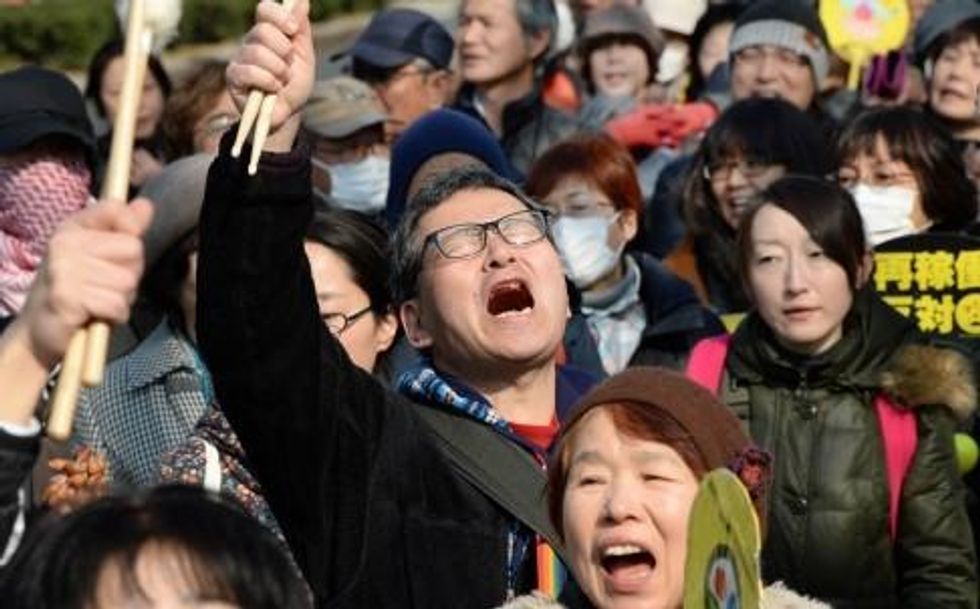Tens of thousands marched and rallied in Tokyo and other Japanese cities on Sunday to mark this week's anniversary of the initial
Fukushima nuclear disaster and delivering a message to Prime Minister Shinzo Abe and parliament that they will not tolerate a restart of the nation's reactors, calling for a future of renewable energy instead.
Carrying banners--some that read "Sayonara Nukes"--and banging drums in Tokyo, the throngs of people with their anti-nuclear message marched to Parliament as they vowed to block attempts by the industry and Abe to re-start more than 45 reactors that remain idle in the country. The say they will never forget the devastation of Fukushima and that their determination to change the energy future of Japan is growing, not waning, as time moves forward.
"The protests are growing," Katsutoshi Sato, a retired railway worker at the rally, told the Associated Press. "All kinds of people are joining, including families with kids."
"I felt it's important that we continue to raise our voice whenever possible," Yasuro Kawai, a 66-year-old businessman from Chiba prefecture, east of Tokyo, toldAgence France-Presse.
"Today, there is no electricity flowing in Japan that is made at nuclear plants. If we continue this zero nuclear status and if we make efforts to promote renewable energy and invest in energy saving technology, I think it's possible to live without nuclear," Mr. Kawai said.
On Saturday, similar rallies were also held ahead of the official anniversary, which is on Tuesday. In Fukushima City, near the reactors where the crisis continues, former villagers marched to commemorate their loss and issue a warning to those around the world who live in the shadow of other nuclear plants.
As Al-Jazeera reports:
An estimated 136,000 people in Fukushima Prefecture remain displaced from their homes.
In the three years since the earthquake, there have been reports of leaks and other issues at the still damaged plant, whose presence and instability have largely overshadowed the recovery effort in the region.
In Fukushima City, a rally of over 1,000 people gathered in a hall, listening to speakers from different areas talk about what they'd lost over the course of the past three years.
Roughly half of that crowd poured onto the streets in an orderly march to the main prefectural hall, chanting against the restarting of the 50 nuclear plants currently shut down for inspections in Japan.
Prime Minister Shinzo Abe is pushing to restart some of those plants.
"I don't think it's going to happen," said Shinya Miura, 29, an administrator for a medical union, when asked if he believed official claims that radiation levels as they stand pose no threat to the general public.
"I might believe that, but it doesn't change my mind - I don't want nuclear power," said Miura.
The Greenpeace Japan Twitter feed was hosting photos from rallies and testimony from those impacted directly by the ongoing disaster at Fukushima:
________________________________


